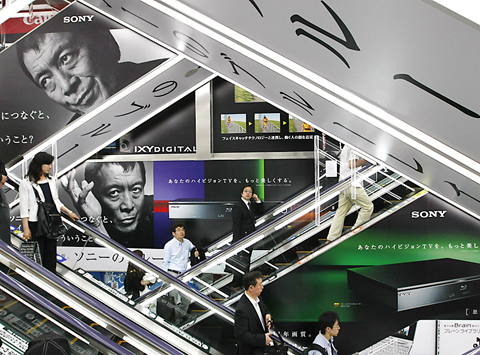Sony Corp reported a ¥98.9 billion (US$1 billion) loss for the fiscal year ended March — its first annual net loss in 14 years — and projected more losses this year amid a serious slump in the global electronics market.
Sony also said yesterday it was closing three plants in Japan to help turn its business around.
Hit by dropping sales and a strong yen, Sony lost ¥165 billion in the January-to-March quarter, compared with a ¥29 billion profit for the same period the previous year.

PHOTO: REUTERS
The Japanese electronics and entertainment company said no quick recovery was in sight, projecting a ¥120 billion (US$1.2 billion) loss for the fiscal year through March 2010.
The results are a reversal from the ¥369.4 billion profit Sony recorded a year earlier. Sales for the fiscal year through March slid 12.9 percent to ¥7.73 trillion, it said.
Sony, which makes Bravia flat-panel TVs and Cyber-shot digital cameras, is closing three plants in Japan by the end of December — one for handsets, another for video recorder parts and another for systems used for smart cards. After they are shuttered, the number of Sony’s global plants will dwindle from 57 last year to 49.
By operations, Sony said it had an operating loss in its core electronics segment because of the slowing global economy, price competition and a strong yen, which offset profits from its liquid-crystal display TV division.
Sony also continued to lose money in its game segment, where its PlayStation 3 home console and PlayStation Portable have struggled against rival offerings from Nintendo Co, the Wii and DS, as well as in some markets against the Xbox 360 from Microsoft Corp.
The company sold 10.06 million PlayStation 3 machines for the fiscal year through March, up 10 percent from the previous year. It also sold more PlayStation Portable machines, at 14.1 million during the fiscal year, up slightly from 13.8 million.
In its movies division, home entertainment sales declined despite stronger motion picture releases, including Hancock, Sony said.
Analysts say Sony chief executive Howard Stringer, who decided to centralize power earlier this year, has yet to give details of a turnaround plan, including strategies and products.
Stringer has promoted four relatively young executives into his managerial team, representing Sony’s gaming and electronics sectors.
Sony also faces a host of rivals that make similar products, often at cheaper prices, such as Samsung Electronics Co of South Korea, as well as manufacturers from Taiwan, China and other nations, such as Acer Inc (宏碁) and Lenovo Group Inc (聯想).

TRAGEDY STRIKES TAIPEI: The suspect died after falling off a building after he threw smoke grenades into Taipei Main Station and went on a killing spree in Zhongshan A 27-year-old suspect allegedly threw smoke grenades in Taipei Main Station and then proceeded to Zhongshan MRT Station in a random killing spree that resulted in the death of the suspect and two other civilians, and seven injured, including one in critical condition, as of press time last night. The suspect, identified as a man surnamed Chang Wen (張文), allegedly began the attack at Taipei Main Station, the Taipei Fire Department said, adding that it received a report at 5:24pm that smoke grenades had been thrown in the station. One man in his 50s was rushed to hospital after a cardiac arrest

PUBLIC SAFETY: The premier said that security would be tightened in transport hubs, while President Lai commended the public for their bravery The government is to deploy more police, including rapid response units, in crowded public areas to ensure a swift response to any threats, President William Lai (賴清德) said yesterday after a knife attack killed three people and injured 11 in Taipei the previous day. Lai made the remarks following a briefing by the National Police Agency on the progress of the investigation, saying that the attack underscored the importance of cooperation in public security between the central and local governments. The attack unfolded in the early evening on Friday around Taipei Main Station’s M7 exit and later near the Taipei MRT’s Zhongshan

ON ALERT: Taiwan’s partners would issue warnings if China attempted to use Interpol to target Taiwanese, and the global body has mechanisms to prevent it, an official said China has stationed two to four people specializing in Taiwan affairs at its embassies in several democratic countries to monitor and harass Taiwanese, actions that the host nations would not tolerate, National Security Bureau (NSB) Director-General Tsai Ming-yen (蔡明彥) said yesterday. Tsai made the comments at a meeting of the legislature’s Foreign Affairs and National Defense Committee, which asked him and Minister of National Defense Wellington Koo (顧立雄) to report on potential conflicts in the Taiwan Strait and military preparedness. Democratic Progressive Party (DPP) Legislator Michelle Lin (林楚茵) expressed concern that Beijing has posted personnel from China’s Taiwan Affairs Office to its

‘ILLEGAL RULING’: The KMT and the TPP slammed the Constitutional Court judgement, saying it contravened the law and was trying to clear the way for a ‘green dictatorship’ The Constitutional Court yesterday ruled that amendments to the Constitutional Court Procedure Act (憲法訴訟法) passed by the Legislative Yuan last year are unconstitutional, as they contravene due legislative process and separation of powers. The Legislative Yuan on Dec. 20 last year passed amendments stipulating that no fewer than 10 grand justices must take part in deliberations of the Constitutional Court, and at least nine grand justices must agree to declare a law unconstitutional. The Executive Yuan on Jan. 2 requested that lawmakers reconsider the bill, but the Legislative Yuan, under a combined majority of Chinese Nationalist Party (KMT) and Taiwan People’s Party